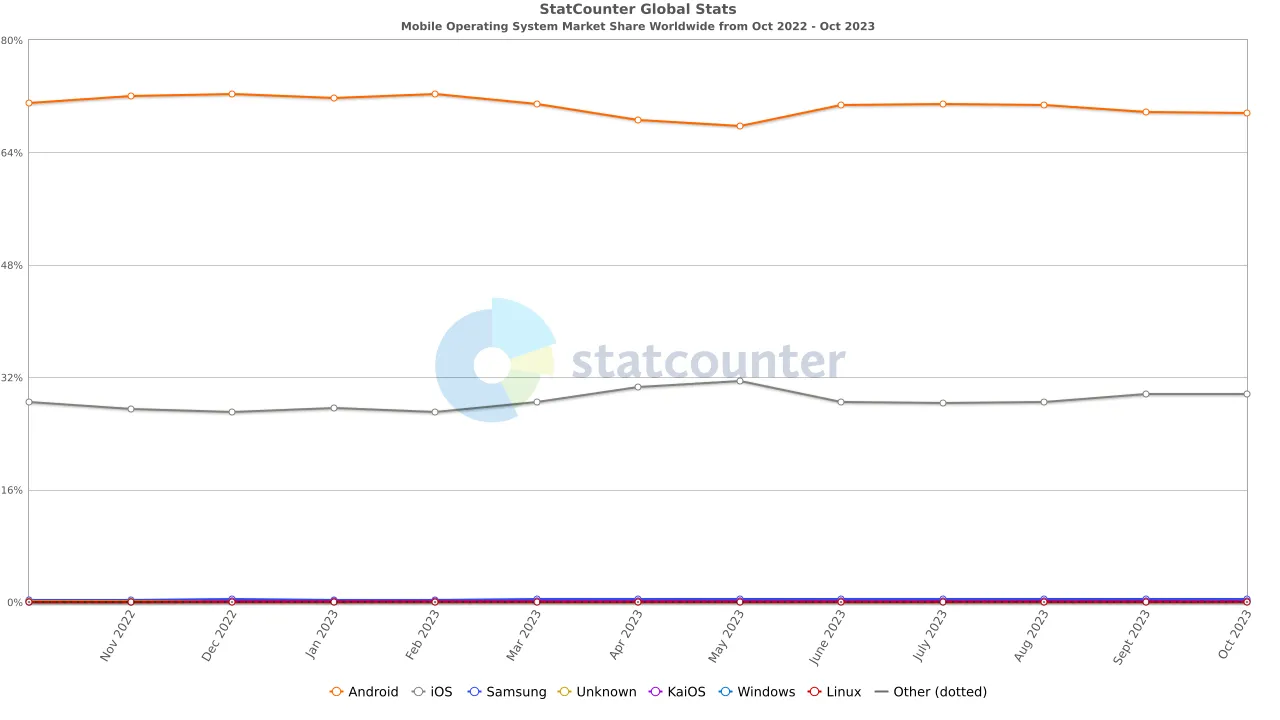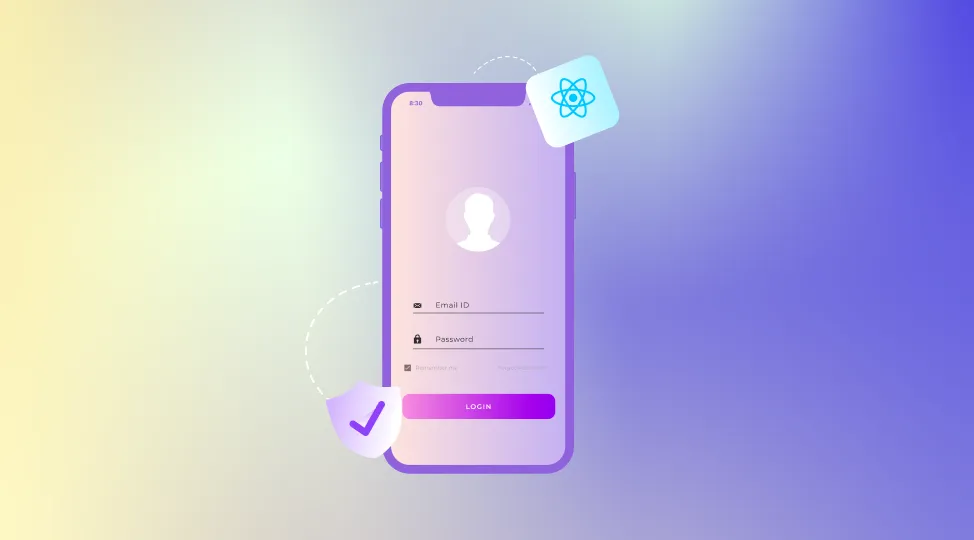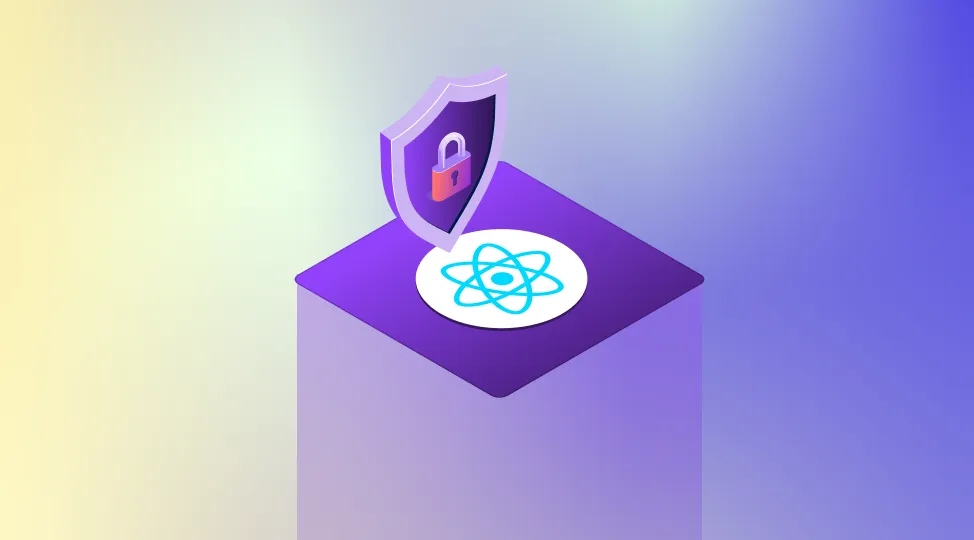In a world increasingly dominated by mobile applications, iOS remains a formidable player. With its loyal user base and a reputation for security and performance, developing iOS apps remains a lucrative venture. However, hire iOS developers to build a successful iOS app to bring your vision to life. But how do you find and hire an iOS developer for your project in 2025? In this comprehensive guide, we'll take you through the steps and strategies to hire dedicated iOS developers who can help you create a stellar mobile app.
In today's business landscape, there's been a substantial shift toward the online sphere, especially with the proliferation of smartphones and tablets. Mobile devices are now a significant source of high-level data traffic, with iOS operating systems alone accounting for a significant share of approximately 27.22 percent, as reported by StatCounter.
 Considering this trend, engaging a dedicated developer to transform your business concept into a tangible reality becomes imperative. To embark on this journey, gaining insights into the expenses of hiring iOS developers is essential.
Considering this trend, engaging a dedicated developer to transform your business concept into a tangible reality becomes imperative. To embark on this journey, gaining insights into the expenses of hiring iOS developers is essential.
However, before proceeding further with this recruitment process to hire iOS developers, let’s understand its importance.
Read On- Improve iOS App Performance- Tricks and Tips
What is iOS Application Development?
iOS application development refers to creating software applications designed to run on Apple's iOS operating system, which powers devices such as iPhones, iPads, and iPod Touches. These applications, commonly known as iOS apps, are available for download and installation through Apple's App Store.
Here are some key aspects of iOS application development:-
Programming Languages
iOS app development primarily involves using two programming languages:
-
Swift: Swift is Apple's preferred and modern programming language for iOS development. It offers a safe and expressive syntax, making writing efficient and maintainable code easier.
-
Objective-C: Objective-C was the primary language for iOS development before Swift's introduction. While it's still used to maintain legacy apps, Swift has primarily replaced it due to its simplicity and performance advantages.
Uncover More- Swift vs. Flutter - Which is Best for ios Apps Development
Integrated Development Environment (IDE)
Xcode is the official integrated development environment for iOS app development. It includes a code editor, interface builder, debugger, and other tools for creating and testing iOS applications.
User Interface (UI) Design
iOS apps are known for their sleek and user-friendly interfaces. iOS developers use Interface Builder in Xcode to design the app's user interface visually or create interfaces programmatically.
Development Frameworks
Apple provides a range of frameworks and libraries that simplify everyday tasks in iOS development, such as Core Data for data storage, Core Animation for animations, and UIKit for building the user interface.
App Store Guidelines
iOS app developers must adhere to Apple's App Store guidelines, which cover aspects like app functionality, design, security, and privacy. Apps that violate these guidelines may be rejected from the App Store.
Testing and Debugging
Thorough testing and debugging are essential parts of iOS development. Developers use Xcode's debugging tools and can deploy apps to physical devices or simulators for testing.
Distribution
Once an iOS app is developed and thoroughly tested, it can be submitted to the App Store for review and distribution to a global audience. Apple reviews each app to ensure it meets its guidelines before making it available.
Updates and Maintenance
iOS app development continues after the initial release. Developers often release updates to address bugs, add new features, and ensure compatibility with the latest iOS versions.
Monetization
iOS apps can be monetized in various ways, including through one-time purchases, in-app purchases, subscriptions, and ads. Developers must choose the right monetization strategy based on their app's purpose and target audience.
Security
iOS is known for its robust security features, and iOS developers must follow best practices to ensure the security of user data and prevent vulnerabilities that malicious actors could exploit.
Overall, iOS application development is a dynamic and evolving field that requires developers to stay up-to-date with the latest technologies and design trends to create successful and competitive apps for the Apple ecosystem.
Continue Exploring- Top 10 iOS App Development Best Practices
Why is iOS Development Important for Business?
iOS development is important for businesses for several compelling reasons, as the iOS platform offers unique advantages and opportunities that can help businesses succeed in the digital marketplace. Hire iOS developers is crucial for companies:
- Access to a Lucrative User Base
iOS devices, including iPhones and iPads, have a large and loyal user base worldwide. These users are often considered high-value customers willing to spend on apps and in-app purchases.
Developing iOS apps allows businesses to tap into this vast and affluent customer base, potentially increasing their revenue and market reach.
iOS is known for its consistent and user-friendly interface design principles. Developing apps for iOS ensures a polished and intuitive user experience, which can lead to higher user satisfaction and retention.
Apple's strict App Store review process also helps maintain a certain level of quality among iOS apps, ensuring that users have a positive experience with the apps they download.
- Robust Security and Privacy
iOS is recognized for its robust security features and stringent privacy controls. This reputation can build trust with users concerned about data security.
For businesses that handle sensitive user data or transactions, iOS development offers a platform that prioritizes user privacy and data protection.
- Monetization Opportunities
iOS apps provide monetization options, including one-time purchases, subscriptions, in-app purchases, and advertising. Businesses can choose the revenue model that best suits their products or services.
Apple's App Store ecosystem offers a convenient payment system that can simplify the process of monetizing apps and generating revenue.
- High-Quality Development Tools
Apple's integrated development environment (IDE), Xcode, is a powerful tool for iOS app development. It includes features such as a code editor, interface builder, debugging tools, and performance analysis tools, making it easier for developers to create high-quality apps.
The availability of Swift, a modern and efficient programming language, further enhances the development process.
- Brand Visibility and Recognition
Having a presence on the App Store can increase brand visibility and recognition. A well-designed and functional iOS app can be a valuable marketing tool, reinforcing your brand's image and credibility.
In many industries, having a presence on iOS devices is a competitive advantage. Offering an iOS app alongside a web or Android app can give your business an edge and attract users who prefer the iOS ecosystem.
- Regular Updates and Improvements
iOS apps can be updated and improved regularly to stay competitive and address user feedback. Apple encourages developers to keep their apps up-to-date with the latest iOS features and technologies.
iOS app development services are essential for businesses looking to reach a global audience, provide a top-notch user experience, and capitalize on the potential for monetization. Developing for iOS can help businesses enhance their brand, increase revenue, and stay competitive in today's digital landscape.
Benefits of Developing an iOS App
Developing an iOS app offers businesses and developers a wide range of benefits. Here are some of the key advantages:-
For SMEs and Big Companies
(1.) Access to a Large User Base: iOS devices have a substantial and diverse user base. Developing an iOS app ensures that your business can reach a vast audience, potentially leading to increased brand recognition and revenue.
(2.) High User Engagement: iOS users are more engaged with their devices and apps. They are more likely to download apps, make in-app purchases, and provide valuable feedback, enhancing the overall user experience.
(3.) Enhanced Brand Image: Offering an iOS app can enhance your brand's image, showcasing your commitment to quality and customer satisfaction. The well-designed and user-friendly interface associated with iOS can positively impact your brand perception.
(4.) Security and Trust: iOS is known for its robust security features and stringent privacy standards. Developing this platform can help build trust with users concerned about data security, making them more likely to share sensitive information or engage with your services.
(5.) Monetization Opportunities: iOS provides multiple monetization options, including one-time purchases, subscriptions, in-app advertising, and in-app purchases. This flexibility allows businesses to choose the revenue model that best suits their products or services.
(6.) Integration with Apple Ecosystem: Integration with other Apple devices and services, such as Apple Watch, Siri, and Apple Pay, can provide additional functionality and convenience for users, enhancing their overall experience.
For Startups
(1.) Market Visibility: Developing an iOS app can increase your startup's visibility and credibility. It can help you stand out in a competitive landscape and attract early adopters who prefer the iOS platform.
(2.) Access to Funding: Many investors and venture capitalists want to support startups with a solid mobile app strategy. An iOS app can make your startup more attractive to potential investors, increasing your chances of securing funding.
(3.) User-Centric Design: iOS strongly emphasizes user-centered design principles. Developing for iOS encourages startups to prioritize user experience and create intuitive and appealing apps, which can lead to better user retention and growth.
Uncover More- Optimizing iOS Apps for Diverse Screen Sizes and Resolutions
(4.) App Store Support: The Apple App Store offers a well-established platform for app distribution. Startups can leverage the App Store's reach to gain visibility and acquire new users more effectively than relying solely on web-based solutions.
(5.) Quality Assurance: Apple's strict app review process ensures that only high-quality and reliable apps make it to the App Store. Going through this process can help startups refine their product and deliver a more polished app to users.
(6.) Global Reach: iOS apps can be accessed by users worldwide, allowing startups to expand their customer base beyond local markets and reach a global audience.
Whether you're a small or large company or a startup, developing an iOS app offers a range of benefits, including access to a large and engaged user base, enhanced brand image, security, monetization opportunities, and a user-centric design approach. The choice to develop an iOS app should align with your business goals, target audience, and overall digital strategy.
Know- Things to Consider Before Developing Your Own iOS App
Developing your iOS app is an exciting venture, but planning and considering various factors is essential before diving into the process. Here are important things to keep in mind:
- Define Your App's Purpose and Goals
Clearly articulate the purpose of your app and the problem it solves for users. What are your primary goals for the app? Understanding your app's objectives is crucial for its success.
Identify your target audience or user demographics. Understanding your users' needs, preferences, and pain points will help you design and market the app effectively.
Conduct thorough market research to assess the competition, identify gaps in the market, and understand user expectations. This information will guide your app's development and marketing strategies.
Decide whether you want to develop exclusively for iOS or multiple platforms (iOS and Android). The choice depends on your target audience and the resources available.
Determine your budget for app development and ongoing maintenance. Consider the costs of design, development, testing, marketing, and potential updates.
- App Monetization Strategy
Determine how you plan to generate revenue from your app. Common monetization strategies include one-time purchases, subscriptions, and in-app advertisements.
- App Design and User Experience (UX)
Invest in a user-friendly and visually appealing design. Prioritize user experience to ensure your app is intuitive and enjoyable to use. Consider conducting user testing to gather feedback.
Familiarize yourself with legal requirements such as copyright, trademarks, privacy policies, and data security. Ensure your app complies with Apple's App Store guidelines.
Decide whether you'll develop the app in-house, hire a development team, or work with an app development agency. Each approach has its pros and cons, depending on your resources and expertise.
Choose the appropriate technology stack for your app. For iOS development, you'll typically use Swift or Objective-C as the programming language and Xcode as the development environment.
Familiarize yourself with Apple's App Store guidelines and policies. Ensure your app adheres to these guidelines to avoid rejection during the app review.
- Testing and Quality Assurance
Develop a comprehensive quality assurance or testing plan to identify and fix bugs and ensure your app functions correctly on various iOS devices and screen sizes. Consider beta testing with a select group of users.
- App Maintenance and Updates
Understand that app development is an ongoing process. You'll need to release updates to address bugs, add new features, and stay compatible with the latest iOS versions.
Plan a well-coordinated app launch. Consider soft-launching the app to a smaller audience to gather initial feedback before a broader release.
- Analytics and Performance Monitoring
Implement analytics tools to track user behavior, app performance, and key performance indicators (KPIs). Data-driven insights can help you make informed decisions.
By carefully considering these factors before developing your iOS app, you can increase your chances of creating a successful and user-friendly application that meets the needs of your target audience and achieves your business goals.
Further Insights- How to Develop an iOS App: From Idea to Launch
[Hire iOS Developers] How to Hire a Dedicated iOS Developer in 2025?
As we enter 2025 the demand for skilled iOS developers continues to rise, making it crucial for businesses to know how to hire iOS developers effectively. With iOS being a prominent platform for mobile app development, finding the right talent can significantly impact the success of your projects. Follow the below process to hire dedicated iOS developers in 2025.
Define Your Project Requirements
Before starting the hiring process, it's vital to clearly understand your project's scope, objectives, and technical requirements. Knowing your needs will help you identify candidates with the right skills and experience.
Choose the Right Hiring Model
Decide whether to hire iOS developers as full-time employees, freelancers, or through an outsourcing agency. Each model has advantages and disadvantages, depending on your project's size and duration.
Create a Detailed Job Description
Craft a comprehensive job description that outlines the responsibilities, qualifications, and skills required for the iOS developer role. Be specific about the programming languages, frameworks, and tools relevant to your project.
Where to Find iOS Developers
-
Online Job Portals: Platforms like LinkedIn, Indeed, Glassdoor, and specialized tech job boards can help you find iOS developer candidates.
-
Networking: Attend industry-specific events, conferences, and meetups to connect with potential candidates. Online communities and forums can also be valuable sources for referrals.
-
Recruitment Agencies: Consider working with recruitment agencies specializing in tech talent. They can help you identify and vet qualified iOS developers more efficiently.
Review Portfolios and Resumes
When you receive applications, carefully evaluate candidates' portfolios and resumes. Look for relevant experience, previous projects, and a strong understanding of iOS development principles.
Technical Interviews
Hire iOS developers by conducting technical interviews to assess candidates' coding skills, problem-solving abilities, and knowledge of iOS development best practices. Include coding challenges and real-world scenarios to gauge their proficiency.
Assess Soft Skills
In addition to technical expertise, assess candidates' soft skills, including communication, teamwork, adaptability, and problem-solving. Effective collaboration is crucial in app development projects.
Cultural Fit
Evaluate whether candidates align with your company's culture and values. A cohesive team with shared values is likelier to work well together and deliver outstanding results.
Compensation and Benefits
Hire iOS developers by offering competitive compensation packages that include salaries, benefits, and opportunities for career growth. Ensure your compensation aligns with industry standards to attract top talent.
Trial Period or Test Project
Consider offering a trial period or a small test project to assess a candidate's performance and compatibility with your team before committing to a long-term contract.
Legal and Contractual Matters
Draft a well-defined contract outlining employment terms, including work hours, payment structure, intellectual property rights, and confidentiality agreements.
Onboarding and Integration
Once you've hired an iOS developer, provide a comprehensive onboarding process to help them integrate smoothly into your team and project.
How Much Does it Cost to Hire Dedicated iOS Developers?
Are you planning to hire iOS developers for your project? The cost of hiring iOS developers can vary significantly depending on several factors. These factors include the developer's experience, location, project complexity, and the hiring model you choose (full-time, part-time, freelance, or agency). Here's a breakdown of the cost considerations:
Experience Level
-
Junior iOS Developers: Junior developers typically have less than two years of experience. They are the most cost-effective option but may require more guidance and supervision. Hourly rates can range from $20 to $50+.
-
Mid-Level iOS Developers: Developers with 2-5 years of experience fall into this category. They can handle moderately complex projects with some autonomy. Hourly rates may range from $50 to $100+.
-
Senior iOS Developers: Senior developers, often with 5+ years of experience, are highly skilled and can handle complex projects independently. Their hourly rates can start at $100 and go up significantly.
Location
Developer rates vary by location due to differences in the cost of living and demand for iOS developers.
For example, developers in North America (e.g., the United States and Canada) generally have higher hourly rates compared to developers in Eastern Europe, Asia, or South America.
Project Complexity
The complexity of your iOS project plays a significant role in cost determination. The iOS appdevelopment cost is less than complex apps with advanced functionalities and integrations.
Hiring Model
-
Full-Time Employee: Hiring an iOS developer as a full-time employee involves salary, benefits, and potentially other overhead costs. This is a long-term commitment.
-
Part-Time Employee: Part-time iOS developers work fewer hours than full-time employees, which reduces costs but may extend the project timeline.
-
Freelance Developer: Freelancers are hired on a project-by-project basis or for specific tasks. They often charge hourly or per-project rates, making it a flexible and cost-effective choice.
-
Development Agency: App development agencies offer end-to-end services and often charge higher rates, but they provide a team of experts, including designers, testers, and project managers.
Additional Costs
In addition to developer fees, consider other costs such as design, testing, quality assurance, and ongoing maintenance. These can significantly impact your overall project budget.
Platform and Device Compatibility
If your app needs to be compatible with various iOS versions and devices (e.g., iPhones and iPads), the development effort and cost may increase.
App Complexity
Features like in-app purchases, real-time synchronization, third-party integrations, and complex animations can add to the development cost.
The cost to hire iOS developers can range from $20 to $200 or more per hour, depending on various factors. Defining your project's requirements and budget constraints before embarking on the hiring process is essential. Additionally, consider the long-term costs, such as maintenance and updates, to ensure your app remains functional and up-to-date after the initial development phase.
Take Away
Hire iOS developer in 2024-25 is an essential tip for businesses looking to thrive in the ever-evolving world of iOS application development. The iOS ecosystem continues to grow with the demand for skilled developers who can create innovative and user-friendly applications. Following the steps and tips outlined in this blog, you can streamline the hiring process, make informed decisions, and ultimately find the perfect iOS developer to bring your app ideas to life.
Remember, hiring the right iOS developer is not just about their technical skills; it's also about their passion for the platform, ability to adapt to new trends, and capacity to collaborate effectively with your team. Take your time to evaluate candidates thoroughly, consider their past work, and conduct interviews assessing their technical prowess and cultural fit within your organization.
In the end, investing in a dedicated iOS developer is an investment in the future of your business. With their expertise and your vision, you can build exceptional iOS apps that captivate users, boost engagement, and drive your brand's success in the competitive mobile market.
Tags
iOS App Development Services
Hire iOS App Developer
Hire iOS Developer



 Facebook
Facebook
 Twitter
Twitter
 LinkedIn
LinkedIn
 Pinterest
Pinterest
 Considering this trend, engaging a dedicated developer to transform your business concept into a tangible reality becomes imperative. To embark on this journey, gaining insights into the expenses of hiring iOS developers is essential.
Considering this trend, engaging a dedicated developer to transform your business concept into a tangible reality becomes imperative. To embark on this journey, gaining insights into the expenses of hiring iOS developers is essential.




